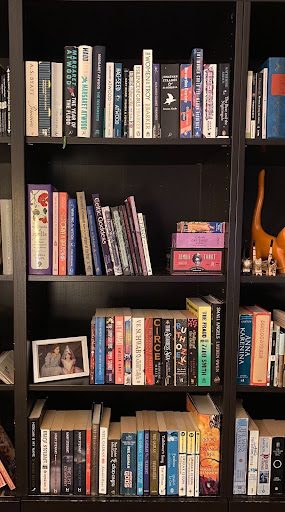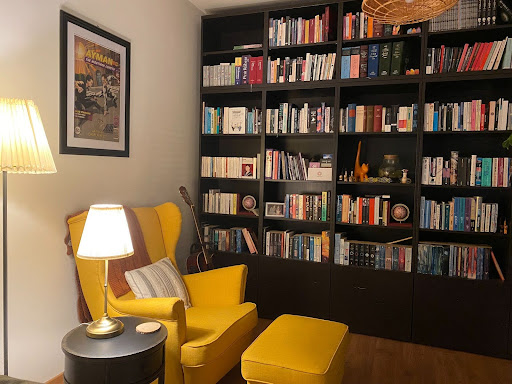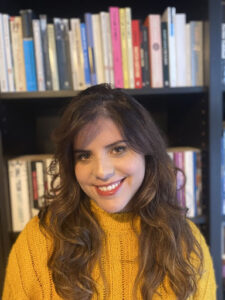Thank you to Luna for taking time to share these wonderful insights with The Letter Review community.
Would you please tell us a little about your writing process?
It’s lengthier than I’d like! I’ll have an idea and it will sit in the back of my mind for months (or, more likely, years) taking shape. Then, when it’s time for the actual writing, I take a very freewheeling approach: I never have an ending or plot structure in mind, I let the characters lead the way. With The Season of the Wolf (Winner of TLR Prize), for example, I had no idea it would end the way it did until I’d actually written it.
What motivated / motivates you to write?
Writing is how I make sense of myself and the world. It’s the best way I know to voice opinions, elaborate feelings and speak up about something I care about. My motivation is simply the urge to express myself: If I have something to say, I’ll write about it.
Do you enjoy writing?
Yes and no. Writing is a delight when the words pour out of you – it can be cathartic and liberating, like running downhill. It can also be difficult, agonising, stressful, mind-bending and even boring. But if it were always easy, it wouldn’t be nearly as much fun or rewarding.
What is the best piece of advice you have received? Or, what is the best piece of advice you would offer an aspiring writer?
We always hear that rejection is part of the business and to not be disheartened by it, but it’s perfectly valid to be disappointed when you get rejected over and over again. Just don’t let it stop you and don’t change the essence of your writing for the sake of external validation. Keep improving and learning, but stay true to your voice. The most important story is the one only you can tell.
Who would you say are your literary forebears? Who have you learned the most from?
I’m tremendously inspired by trailblazing, rebellious women in any creative field – Margaret Atwood, Clarice Lispector, Mariana Enriquez, the Brontë sisters, Jane Austen, Glória Maria, Martha Gellhorn, Patti Smith, Chelsea Wolfe, PJ Harvey, Courtney Barnett, Rita Lee and Elis Regina, to name a few. But my biggest literary inspiration is Ursula K. Le Guin – she had a knack for creating whole new worlds that revealed truths about our own, and that showed us how much better we can be.
What do you believe is the function of your art?
Going back to Ursula Le Guin, she once said, “I think hard times are coming, [and] we will want the voices of writers who can see alternatives to how we live now, who can see through our fear-stricken society and its obsessive technologies to other ways of being, and even imagine some real grounds for hope”. These words guide my approach to writing and describe the kind of writer I aspire to be.
What is the role of the writer in society?
Writers are not just storytellers, we are truth-tellers. Every one of us has something to say that the world needs to hear. Our words inspire people to think critically, ask questions, resist oppression, dream of better ways to live and shape the world around them in ways big and small. Speaking truth to power is getting harder, and therefore more important than ever.
What are the major benefits of being a writer?
Writing is timeless. You write words today that will hopefully be read, remembered and cherished decades from now. It’s a precious legacy and a generous gift from writer to reader, because every word holds the potential for transformation. In other words, we create literal magic – through our stories, writers forge lifelong bonds that defy time and space, with people we’ve never met or even shared a lifetime with.
Are there any downsides to being a writer?
Our craft is chronically dismissed and undervalued, both financially and socially. Writers are always fighting the uphill battle of advocating for their work and being rewarded fairly for it, in a world that increasingly sees art as an expendable triviality.
Would you mind sharing a photograph of a part of your bookshelf (or your library) that is meaningful to you? What makes it meaningful to you?

When my husband and I bought our house, we immediately fell in love with this reading nook. We filled the bookshelves with fantastic books and put up a comfy chair, footstool, lamp and side table, perfect for reading with a hot cup of tea on a rainy day. We have different sections for non-fiction, classics, comics, poetry and other genres, but there is a section that I think of as “my corner” – it has my books on witchcraft and spirituality, my tarot decks and my favourite books written by female authors. Whenever I’m looking for a new book to read, this is where I always go first.

Luna Campos is a writer originally from Brasília, Brazil. Luna has always been passionate about literature, growing up with her nose buried in books. After graduating in Psychology at the University of Brasília, Luna pursued an MA in Comparative Literature from University College London, where she researched female perspectives in modern retellings of classical myths. After working in marketing in the UK and Belgium for years, she finally embarked on the writing career she’d always dreamed of. Inspired by the counterculture and youth movements that flourished during Brazil’s military dictatorship, Luna became interested in works of fiction that dissect power dynamics in authoritarian societies. This curiosity deeply influenced her writing, which explores themes of trauma, oppression and resistance. When she’s not writing, Luna spends her time painting, reading, or eating irresponsible amounts of sweets. She’s also a consummate animal lover, especially cats. Luna lives in Belgium with her husband and cat. The Season of the Wolf is her debut novel.

